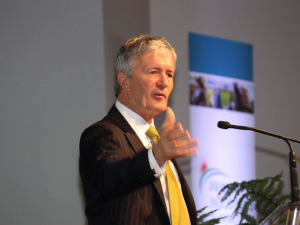Primary industry “gave the finger” to attempts to overhaul the original NAIT scheme, Biosecurity Minister Damien O’Connor says.
It was important that the minister had the ability to direct, O’Connor said in a parliamentary debate on the NAIT Amendment Bill.
The industry body in charge of NAIT, OSPRI, was focussed on getting tags on animals and traceability, not the wider issues of M. bovis management, he said.
“When we asked them for a bit of cooperation to help us [with M. bovis] they were, quite frankly, uncooperative and gave us the finger, quite frankly.”
Under existing law “there was no ability for the minister to step in and ask them to step up their game and focus on not just animal tracing but actually being part of a useful biosecurity system,” he said.
Under the NAIT bill, OSPRI would no longer have a specific biosecurity function, but a clause in new legislation would allow the Government to instruct OSPRI to use NAIT for a biosecurity programme if required.
O’Connor said NAIT needed to be amended because it was missing basic requirements, eg tags linked to a single location.
It appeared a growing number of farmers had been sending stock to processing plants without tags because tags were inconvenient. Farmers would pay a $35 fine for untagged animals but some farmers found the penalty “too easy”.
Now, a tag could only be left off it was genuinely unsafe to tag. Inconvenience would no longer be acceptable, O’Connor said.
The previous biosecurity minister in charge of NAIT, National’s Nathan Guy, said the bill was a good one and his party supported it. One of his concerns, however, was that the ministerial direction clause was snuck in to the NAIT Bill “late in the piece” and that it could give a minister excessive influence over the NAIT scheme.
Guy said he hated to think a minister of the day could direct NAIT officers as to what they should be doing based on a particular government’s priorities or expectations.
“I would have thought that [the expectation of] any government, whether it’s a blue stripe government or a red stripe government, would be for NAIT to do the right job for farmers, for animals, for biosecurity, for food safety and the like,” he said.



















